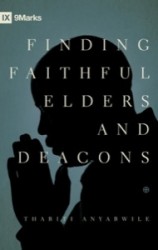 One of my favorite books on church officers is Thabiti Anyawile’s Finding Faithful Elders and Deacons. Many books on elders and deacons offer sustained exegesis on 1 Timothy 3 and Titus 1. Thabiti’s work fills a gap by offering sustained applications of the relevant texts.
One of my favorite books on church officers is Thabiti Anyawile’s Finding Faithful Elders and Deacons. Many books on elders and deacons offer sustained exegesis on 1 Timothy 3 and Titus 1. Thabiti’s work fills a gap by offering sustained applications of the relevant texts.
With warmth and wisdom he offers brief explanations of each qualification and then helps us discern how to spot those qualifications in the life of a given man.
SEEING SOBER-MINDEDNESS
1 Timothy 3:2 says an elder must be “sober-minded, self-controlled, respectable.” Sober-mindedness connotes a man who is watchful and circumspect, one who is free from the excessive influence of passion, lust, or emotion. Likewise, a self-controlled man has control over his inward state and outward actions, and is not given to rashness or foolishness.
Anyabwile says, “Where sober-mindedness and self-control reign, there you have a respectable man. He lives a godly, ordered life.” Thabiti then provides five questions to help us spot a sober-minded, self-controlled, and respectable man. The second question may be a bit surprising. But he is right on track.
TRENDINESS IN LIFE
He writes, “Is a man trendy? Is he a lover of fads, bouncing from one new thing to another?”
A trendy man places emphasis on novelty, so by definition things outside himself exert control over him. He hungers for the ever-changing, ever-elusive ‘next great idea.’ He may be ‘down’ with the coolest in the congregation, but the very basis of that acceptances stems from the kind of instability that works against sobriety, watchfulness, and self-control.
We might see this in his style of dress or other purchases (cars, etc.). While we do not wish to be prudish about outward things, outward trendiness might be an early warning sign of trendiness in the more important world of ideas. Is this a man who chases every new church fad or model for doing church? Is he drawn to novel theological ideas? Trendiness nearly destroyed the church from within, and such things should be avoided. Instead, we should look for men who are steadfast in their resistance to fads and unhealthy trends and who adopt a consistently sound, biblical view of themselves, the world, and God. (68-69)
The root concern then with trendiness is it may display a gravitation towards novelty, which becomes a massive issue when we get into the world of doctrine.
TRENDINESS IN DOCTRINE
Later on in the book Thabiti returns to this topic in his chapter on “What Good Pastors Do” and the section “Elders Watch Their Doctrine.” One way elders can watch their teaching is to “avoid novelty and fads.” Anywabwile writes,
Most error starts with novelty, with a desire to say something new or innovative. But few faithful teachers want to be doctrinally innovative. . . . Paul tells Timothy to avoid irreverent, silly myths. The good pastor will follow Paul’s counsel. The world clamors ceaselessly for new things. It wants ingenuity and breakthroughs. There is something about the human heart that craves to be an original, to be unique. But great explosions of error occur when a pastor’s combustible lust for cleverness and originality mingles with the fuel of worldly desire for novelty. (157-158)
So, when examining future men for ministry, put ’em through the trendiness test. It is not innately wrong or foolish, but it may belie a soul prone to ride faddish waves of faith and practice. What we want is men who surf on the old paths of prophets, apostles, and our Lord.
